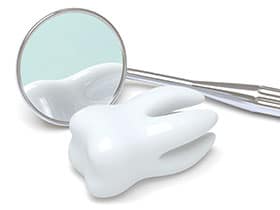When is a Tooth Extraction required?
 A tooth extraction procedure is needed if a tooth is decayed or broken beyond repair. Depending on the condition of the tooth, extraction procedures include:
A tooth extraction procedure is needed if a tooth is decayed or broken beyond repair. Depending on the condition of the tooth, extraction procedures include:
Simple tooth extraction
Performed on visible teeth in the mouth under local anesthesia (the tooth is loosened from its socket and then removed with dental forceps).
Surgical tooth extraction
A more complicated procedure for teeth that are badly broken down and cannot be removed without surgery.
How long will it take for my gums to heal after a tooth extraction?
This depends on a person’s general, post-operative care, size and location of the tooth.
Simple tooth extraction
If your tooth has fully erupted, the wound from your tooth extraction should heal within 7 to 10 days. The gums will usually fully close in about 3-4 weeks after the tooth was extracted and the bone will regrow in around 3 months.
Surgical extraction
If your tooth is within the gums (not fully erupted or is badly broken down), recovery will take a little longer. The healing will range from a week to 3 weeks and it will take about 8 weeks for the hole to close fully. Avoid heaving brushing, flossing, or chewing near the treatment area during the first few days.
Dos and Don'ts after a tooth extraction:
How long should I wait before I remove the gauze after a tooth extraction?
After your surgical procedure, apply pressure (bite) on the gauze for about 1 to 3 hours to allow clotting.
What can I do to help make the extraction heal faster?
- Continue brushing (lightly) and flossing. This is to prevent infection. You should avoid traumatizing the extraction site, so you don’t injure the wound.
- Take the medications as prescribed, including over-the-counter medications such as Panadol.
- Rest well and limit your physical activity during the period of recovery. Physical activities increase the blood pressure and heart rate and will in turn induce the onset of bleeding.
What should I avoid after a tooth extraction?

- Avoid eating sticky and hard food such as nuts, sweets or chocolate, shells and hard meat that might end up being lodged in the extraction socket.
- Your neighboring teeth may still be sensitive. Do not drink anything hot or extremely cold over the next few days.
- Avoid drinking alcohol. Alcohol dries and prevent blood clot formation. This may result in a dry socket which is painful.
- Avoid smoking
- Avoid vigorous physical activities.

How long after tooth extraction can I eat?
You should consume soft foods and liquids after your tooth extraction for at least for a day. Subsequently, you should opt for foods that are easy-to-chew, such as porridge or soupy food.
What are common sequelae of getting your teeth removed?
- The wound may bleed for a few hours.
- You may get fever and chills, which may indicate an infection.
- You may feel nauseous or feel like vomiting.
- You may experience swelling and redness at the surgical site.
- The area may hurt, which can be managed by the prescribed painkillers.
Consult a dentist if you need a tooth extraction. Make an appointment online or contact a dental clinic near you. We have 11 dental clinics located islandwide.
